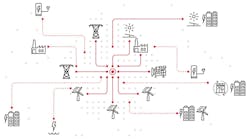IDC Energy Insights has announced the availability of a new study, Utility CIOs: Living in a Smart Grid World (Document #EI225592) that presents the results from a survey conducted with North American utility executive IT leaders to assess the role of IT leadership in the smart grid world.
Of particular note, according to results, privacy has emerged as the number-one concern related to data security and management, with data governance as an emerging concern. As utilities implement new initiatives such as smart metering, data volumes are expected to increase significantly. However, the survey reveals that, while management and integration of this data are a priority, respondents overwhelmingly report data privacy as the key element of IT strategic plans for security.
"Customers have a great deal of concern about how their data is being used and distributed, and our survey indicates that utilities are taking this issue extremely seriously," said Jill Feblowitz, IDC Energy Insights practice director.
Another surprising finding is that one-third of the utilities surveyed noted that IT is not involved in developing business cases for new initiatives such as renewable generation, energy efficiency, smarter distribution grids, and smart metering. Even more worrisome is that for 13% of utilities, IT does not become involved until the project is well under way.
"Early involvement of IT mitigates the risk of choosing inappropriate or expensive technology," continued Feblowitz. "It is far more likely that IT investments will be thoroughly and accurately accounted for when IT is involved in the development of the business case from the start. Failure to do so can hinder the ability for utilities to implement new initiatives without requiring a reassessment of the funding required – and possibly the need for consumer rate increases."
Additional findings from the report include the following:
- Utilities are using smart grid funding to invest in technology not typically associated with smart grid – business applications, enterprise telecommunications, enterprise architecture, and business process modeling tools.
- Most utilities have an IT strategic plan that takes smart grid into account. The most frequently mentioned focus areas were improved operational efficiency, grid security, and support of new programs such as demand response.
This report examines the role of the utility CIO as new technology and potentially new business models transform the industry. It also provides further insight into how utilities are addressing IT strategy and budget, governance, business process reform, data management and security, and enterprise architecture.

